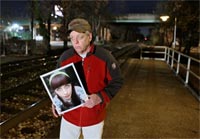This news item expired on Tuesday, December 31, 2013 so the information below could be outdated or incorrect.
Don't carelessly endanger your life - stay off the railroad tracks! People seem to think, "It could never happen to me, I can hear the train coming - I can get out of the way in time." Well, it can happen to you. There have been many injuries and deaths that could have easily been prevented if people avoided railroad tracks.
Check out this video to learn more.
Walking on the railroad tracks is not only against the law, it's also dangerous. What if your foot got caught in the tracks, or you are walking across a trestle and a train is bearing down on you? Would it be worth it?
Train engineers are mortified at the number of people they see walking on the railroad tracks and especially the number of people who walk or jog with their headphones on. There have been too many close calls to count, and numerous deaths. See videos.
Think of how it would feel if you were doing everything you can to stop an 8,000 ton train to keep killing someone? Your heart is racing as you continuously blast the horn, the train is sliding towards them and you are praying that they will realize you are there and get out of the way in time. Many people have said to themselves, "I thought I had the music turned low enough to hear a train coming." Being mistaken could cost you your life. Do you  really want to take that chance?
really want to take that chance?
Please remember:
-
Stay away from Railroad tracks, trestles, yards and equipment. They are private property and trespassers are subject to arrest and fine.
-
It can take a mile or more to stop a train. A locomotive engineer who suddenly spots you ahead has little chance to miss you.
-
Trains overhang the tracks by at least three feet in both directions and loose straps hanging from rail cars may extend even further. If you are in the right-of-way next to the tracks, you can be hit by the train.
-
The only safe place to cross is at a designated public crossing with either a crossbuck, flashing red lights or a gate. If you cross at any other place, you are trespassing and can be ticketed or fined.
-
Do not cross the tracks immediately after a train passes. A second train might be blocked by the first. Trains can come from either direction. Wait until you can see clearly around the first train in both directions.
-
DO NOT cross the tracks until the lights have stopped flashing and it is safe to do so. Flashing red lights signal that a train is approaching from either direction. You can be fined for failure to obey these signals. Never walk around or behind lowered gates at a crossing.
-
If you are in a rail yard uninvited, you are trespassing and subject to criminal prosecution. The worst penalty is death.
-
DO NOT hunt, fish or bungee jump from railroad trestles. There is only enough clearance on the tracks for a train to pass. Trestles are not meant to be sidewalks or pedestrian bridges!
-
DO NOT attempt to hop aboard railroad equipment at any time. A slip of the foot can cost you a limb or your life.
-
Be aware trains do not follow set schedules. Any time is train time!
-
Do not walk, run, cycle or operate all terrain vehicles (ATVs) on railroad tracks or rights-of-way or through tunnels.
"North Carolina is, unfortunately, sixth in the nation with trains and trespassing injuries,” said Vivian Speight-Bridges, the state director of Operation Lifesaver. "People need to know the potential hazards presented to trespassers. Trains can’t swerve or stop to miss you. Although trains are huge machines, environmental conditions can muffle sounds and they can approach you without your knowledge. Flying debris, banding and tie-down devices that have become unsecured can strike anyone within the right-of-way."
For more information on railroad safety and North Carolina’s Operation Lifesaver, visit www.ncol.org or call (919) 831-3006.